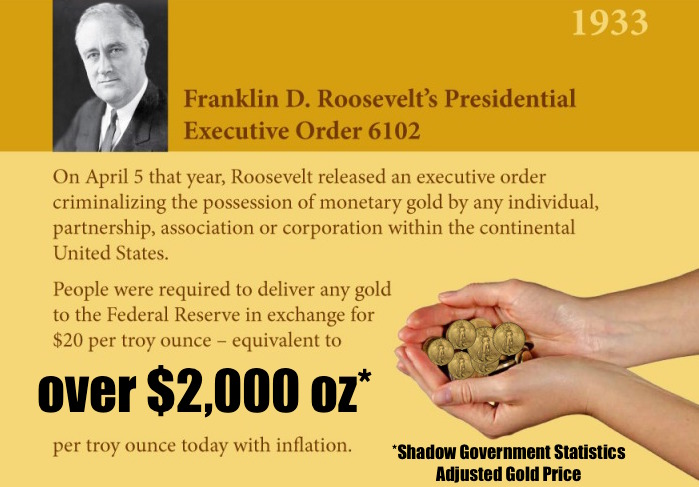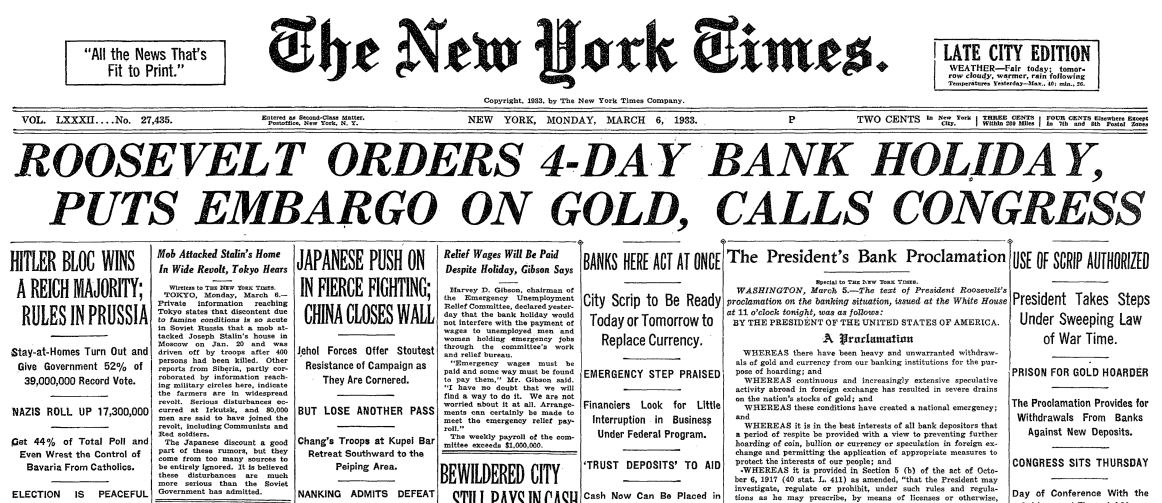More On: Franklin Roosevelt
When the US government took all the gold from its people
Why Did Roosevelt's New Deal Spending Fail to Lift the American Economy?
Ninety years ago, Franklin Roosevelt told Americans that they had less than a month to give up their gold or they may go to prison for up to ten years.
Franklin Delano Roosevelt called December 7, 1941 "a date that will live in infamy." This means that people will always remember it as a bad day. On April 5, 1933, FDR gave the order to seize all of the private gold that people in the United States had. By targeting innocent people, he bombed the country's gold standard just as clearly as Japan bombed Pearl Harbor.
On the 90th anniversary of the seizure, it's important to remember what happened, for a number of reasons: It was one of the worst misuses of authority in a decade when there were so many it was hard to keep track. It's an example of a poor policy that was put on people who didn't do anything wrong because the government made the conditions that were used to justify it. And the fact that people are following the rules, even if it's just a little bit, is a worrying sign of how fragile freedom is in a crisis.
On April 5, 1933, FDR issued Executive Order 6102, which advised Americans they had less than a month to turn up their gold coins, bullion, and gold certificates or face up to ten years in prison, a $10,000 fine, or both. After May 1, it would be just as illegal to own or have these goods as it would be to have Demon Rum. After Prohibition was ended later that same year, the man who was sober and had gold in his pocket was the criminal and the drunk man who was stumbling around was just a nuisance.
FDR said that saving gold was slowing down the recovery from the Great Depression. If you can follow the logic, the government, which caused the Depression in the first place, had no choice but to take the gold and hoard it itself. But, of course, the main difference was that when the gold was in the hands of the government, the Federal Reserve could utilize it as a way to make more paper money. During his campaign in 1932, the President promised to cut government expenditure by 25%. Now, he could spend twice as much in his first term.
What proof did Americans have that they were "hoarding" gold? Roosevelt said that there was a rush on banks right before his April 5 seizure order. People did show up at bank windows with paper dollars and ask for the gold that the paper notes said they would get. But Roosevelt was the one who made people rush to the banks!
On March 8, three days after taking over as President from Herbert Hoover, FDR said that the gold standard was safe. After all, America had the most gold of any country in the world. Then, out of the blue, on March 11, the President issued an order telling banks they couldn't accept payments in gold. Even though they said they would defend the value of the currency during the campaign, it was evident that this administration planned to spend and print money like never before. People who wished to protect their savings and other financial assets had a compelling motive to find and save as much gold as they could. In his book "The Great Gold Robbery," James Bovard says,"
Roosevelt was hailed as a visionary and a savior for his repudiation of the government’s gold commitment. Citizens who distrusted the government’s currency management or integrity were branded as social enemies, and their gold was seized. And for what? So that the government could betray its promises and capture all the profit itself from the devaluation it planned. Shortly after Roosevelt banned private ownership of gold, he announced a devaluation of 59 percent in the gold value of the dollar. In other words, after Roosevelt seized the citizenry’s gold, he proclaimed that the gold would henceforth be of much greater value in dollar terms.
Dentists, jewelers, and industrial users were allowed to acquire gold to meet their “reasonable needs.” If you had a gold tooth, the government did not yank it out. But if you possessed more than $100 in monetary gold (coin or notes denominated in the yellow metal) after May 1, 1933, you were a villainous lawbreaker until private gold ownership was legalized four decades later.
With the passage of the Thomas Amendment to an agricultural bill on May 12, 1933, vast new presidential powers over money were affirmed by Congress. But even some of FDR’s own party still had a conscience. Democratic Senator Carter Glass of Virginia solemnly and honestly lamented,
It's dishonor, sir. This great government, strong in gold, is breaking its promises to pay gold to widows and orphans to whom it has sold government bonds with a pledge to pay gold coin of the present standard of value. It is breaking its promise to redeem its paper money in gold coin of the present standard of value. It’s dishonor, sir.
When FDR followed up in June by abrogating the gold clauses in both private and government contracts, he asked blind Oklahoma Senator Thomas Gore, a fellow Democrat, for his opinion. Gore had lost his eyesight at the age of 12 but he saw right through FDR on this matter. He famously replied, “Why that’s just plain stealing, isn’t it, Mr. President?”
In his book, Economics and the Public Welfare, A Financial and Economic History of the United States, 1914-1946, the great economist Benjamin Anderson recalled Senator Gore’s words on the Senate floor:
Henry VIII approached total depravity, as nearly as the imperfections of human nature would allow. But the vilest thing that Henry ever did was to debase the coin of the realm. [See: “How Henry VIII Debauched English Money to Feed His Lavish Lifestyle.”
Many Americans were cowed by government threats to do the “patriotic” thing and turn in their gold as Roosevelt mandated. But true to the rugged individualism and defiance of tyranny ingrained in our culture, FDR’s order prompted widespread noncompliance. Best estimates, corroborated in this short video and elsewhere, suggest that for every one dollar in gold that Americans relinquished, they quietly kept three.
If the federal government tried today to seize the gold holdings of private American citizens, how much do you think we would turn over?
Call me a scofflaw if you want, but it would NOT get its hands on mine.
** Information on these pages contains forward-looking statements that involve risks and uncertainties. Markets and instruments profiled on this page are for informational purposes only and should not in any way come across as a recommendation to buy or sell in these assets. You should do your own thorough research before making any investment decisions. All risks, losses and costs associated with investing, including total loss of principal, are your responsibility. The views and opinions expressed in this article are those of the authors and do not necessarily reflect the official policy or position of USA GAG nor its advertisers. The author will not be held responsible for information that is found at the end of links posted on this page.













